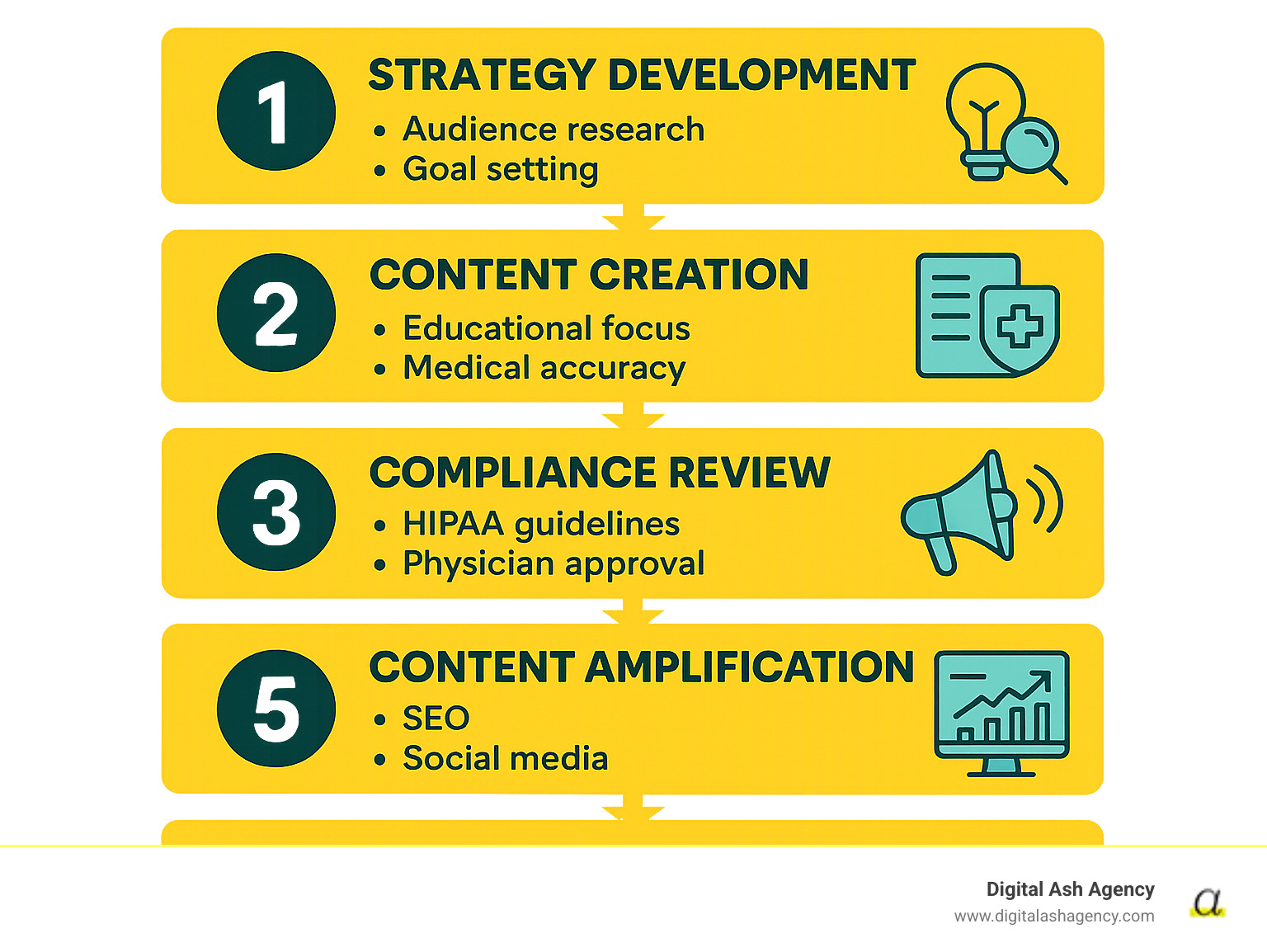
Why Medical Content Marketing is Changing Healthcare Today
Content marketing medical strategies are essential for healthcare practices looking to build trust, educate patients, and grow. With 73% of Americans getting health information online and 7% of all Google searches being health-related, patients are actively seeking reliable medical content.
Quick Implementation Guide for Medical Content Marketing:
- Develop a patient-centered strategy - Research your audience's health concerns.
- Create educational, compliant content - Focus on accuracy, HIPAA, and simple language.
- Choose effective formats - Use blogs, videos, testimonials, and infographics.
- Optimize for search engines - Implement local SEO and target health-related keywords.
- Measure and refine - Track traffic, engagement, and patient acquisition.
In the $2.5 trillion U.S. healthcare industry, patients now turn to "Dr. Google" to research symptoms, treatments, and providers. This shift presents a major opportunity. While most healthcare companies see positive results from content marketing, only a minority have a defined strategy.
Success isn't just about visibility; it's about building trust. However, a credibility gap exists: 52% of the U.S. population is concerned that online healthcare content isn't credible, and 47% worry it's just a sales pitch. This is an opportunity for practices that prioritize patient education over aggressive sales.
I'm Ashley Gay, a branding expert. I helped my physician husband's practice generate $239K in its first 90 days using strategic content marketing medical approaches. My experience proves how powerful patient-focused content is for sustainable growth, even with non-compete restrictions.

Why Content Marketing is a Non-Negotiable for Modern Medical Practices
The modern patient journey begins with a Google search, not a phone book. This shift in the $2.5 trillion U.S. healthcare industry means content marketing medical strategies are no longer optional. They position your practice as the trusted voice patients need during vulnerable moments.
Content marketing works because it provides reliable, accessible health information. With healthcare companies reporting overwhelmingly positive results from their efforts, the impact is clear. By creating content that helps patients understand chronic diseases or other health issues, you provide a public service that naturally leads to patient acquisition.
The Shift from Word-of-Mouth to "Dr. Google"
Today's patient behavior has fundamentally changed. Before scheduling an appointment, patients research symptoms, treatments, and your practice online. This search engine reliance is the new reality of healthcare decision-making.
This is especially true on social media, where 41% of consumers choose a doctor. They want to see how you communicate and if you can explain complex topics simply. By addressing patient concerns online with helpful content, you gain a significant competitive advantage and become the obvious choice for care.
Building the Most Valuable Asset: Patient Trust
Trust is everything in healthcare, but a credibility gap exists. 52% of people are concerned about the credibility of online health content, and 47% worry it's just a sales pitch. This skepticism creates an opportunity.
When you consistently deliver accurate, empathetic, and helpful content, you stand out. You become a trusted resource, not just another practice. Establishing thought leadership through content marketing medical strategies means putting patient education first. These long-term relationships begin the moment a patient finds your content and feels more informed and less afraid, building a foundation of loyalty.
For practices looking to build this connection, our guide on Branding for Doctors offers practical strategies. You can also explore our comprehensive approach in our Digital Marketing for Doctors resource.
The Core Components of Content Marketing Medical
Successful content marketing medical strategies require a solid foundation. This starts with a patient-centric approach, combining a structured content calendar with genuine empathy and unwavering accuracy. This transforms ordinary content into a resource that truly serves and connects with people.
Step 1: Developing Your Content Marketing Medical Strategy
Only a minority of healthcare marketers have a documented strategy. To join that successful minority, you must understand your patients deeply. Create detailed audience personas to identify their patient pain points. Set SMART goals to give your content purpose, such as increasing website traffic by 50% or generating 20 new patient inquiries per month. Conduct a content gap analysis to find opportunities where patient questions aren't being answered, and use competitor analysis to find your unique voice.
Step 2: Navigating Critical Ethical and Legal Guardrails
Medical content carries immense responsibility. Medical accuracy and fact-checking are non-negotiable, and every piece of content requires physician review to ensure scientific validity. Patient privacy is paramount; HIPAA compliance extends to all patient stories and testimonials, so always follow the official HIPAA compliance guidelines.

Finally, 1 in 3 adults have low health literacy. Avoiding jargon and using simple language is crucial. Your goal is to translate complex medical concepts into content that empowers, not intimidates.
Step 3: Choosing Effective Content Formats to Engage and Educate
Matching your message to the right format is key for content marketing medical success. A diverse approach ensures your message reaches everyone.
- Blog posts and articles: The backbone of your strategy, perfect for in-depth topics and SEO.
- Video content: Essential for connecting with patients, as 81% of Americans use YouTube. Create 'Meet the Doctor' videos, explain procedures, or offer office tours.
- Patient testimonials: Build incredible trust, but always get explicit, HIPAA-compliant consent.
- Infographics: Break down complex data into shareable, easy-to-understand visuals.
- Interactive content: Quizzes and health assessments engage users and can generate leads.
- Webinars: Position you as an expert and allow for live Q&A sessions with patients.
For more creative approaches, explore our guide on healthcare advertising ideas.
Amplifying Your Message for Maximum Reach and Impact
Creating outstanding content marketing medical is just the beginning. The magic happens when you get that valuable content in front of the people who need it most through smart content distribution. A multichannel approach meets patients where they are, fostering engagement and building a community around your practice.
The Crucial Role of SEO in Your Content Marketing Medical Strategy
Search Engine Optimization (SEO) bridges the gap between your expertise and the patients searching for it. Google's emphasis on E-E-A-T (Experience, Expertise, Authoritativeness, and Trustworthiness) is tailor-made for healthcare providers, rewarding accurate, expert-backed information with higher visibility.
Your SEO strategy should include:
- Keyword Research: Understand the specific terms and phrases your patients use, including localized searches like "pediatric urgent care near me."
- Local SEO: Optimize for your geographic area, as most patients seek care close to home.
- On-Page and Technical SEO: Structure content for readability, use keywords naturally, and ensure your site is fast and mobile-friendly. If you're struggling, see our guide on Why Your Website Isn't Ranking on Google.
- Voice Search Optimization: Optimize for conversational, question-based queries from smart speakers.
Leveraging Social Media and Email to Build a Community
Social media and email are powerful tools for building relationships and creating two-way conversations.
For social media content promotion, go beyond just posting links. Use storytelling, share behind-the-scenes content, and highlight patient success stories (with consent). Active engagement is key; respond thoughtfully to comments and questions to build trust.
Email marketing creates a direct connection with your audience. Build an email list and use newsletters to share blog posts, health updates, and personalized education. Interactive content like polls can keep your audience engaged. To ensure your campaigns are effective, be sure to avoid these landing page mistakes in your campaigns.
Combining SEO, social media, and email creates a comprehensive digital presence that amplifies your message and maximizes your impact.
Measuring, Optimizing, and Maximizing Your Content's Impact
The magic of content marketing medical happens when you move from creating content to understanding its impact. Tracking Key Performance Indicators (KPIs) is like monitoring a patient's vital signs—it's essential for knowing what's working. This data provides a roadmap for continuous improvement.
How to Measure Success and ROI
Focus on metrics that show whether you're building meaningful patient relationships. Use tools like Google Analytics and Google Search Console to track:
- Website traffic: See where visitors come from and which pages hold their attention.
- Social media engagement: Track shares, comments, and questions to gauge how helpful your content is.
- Conversion rates: Measure how many visitors schedule appointments, sign up for newsletters, or download materials.
- Patient acquisition cost: Calculate your return on investment by comparing content costs to new patient revenue.
Use this data to optimize your strategy. A/B testing headlines and refining your approach based on what works will improve your results over time.
Smart Strategies for Content Repurposing
You don't need to create every piece of content from scratch. Smart content repurposing maximizes the value of your work and reaches new audiences who consume information differently.
- Blog to video script: Turn a detailed post into a reassuring video to add a human connection.
- Infographics from statistics: Convert dry data into compelling, shareable visuals.
- Social media carousels from lists: Break down a list-based article into digestible slides for platforms like Instagram.
- Webinar to blog series: Expand on a webinar topic with a series of in-depth articles.
This approach to maximizing content value ensures you create smarter content that works harder for your practice, building trust across multiple channels without starting over every time.
Frequently Asked Questions about Medical Content Marketing
Here are answers to the most common questions we hear from doctors and practice managers about content marketing medical strategies.
How is medical content marketing different from other industries?
Healthcare content marketing is unique due to several factors:
- Higher stakes: You are dealing with people's health and well-being, so accuracy is critical.
- Trust and credibility: Patient trust is paramount and can be permanently lost with a single misstep.
- Strict regulations: HIPAA governs patient privacy in all content, including testimonials.
- Education over sales: The focus must be on helping patients, not on aggressive sales pitches.
- Medical professional review: All clinical content is non-negotiable and must be reviewed by qualified professionals.
- Sensitive topics: Content often addresses personal health issues, requiring a compassionate and empathetic tone.
What are the biggest mistakes to avoid in healthcare content?
Avoid these common and costly pitfalls:
- Publishing inaccurate information: This can harm patients and destroy your credibility. Always fact-check and get physician review.
- Using excessive medical jargon: With 1 in 3 adults having low health literacy, simple language is essential.
- Violating patient privacy: HIPAA violations can lead to massive fines and reputational damage. Always get documented consent.
- Focusing purely on sales: This alienates patients who are seeking education and support.
- Ignoring SEO best practices: Your valuable content will be wasted if patients can't find it in search results.
- Having no documented strategy: This leads to scattered, ineffective efforts that fail to deliver results.
How can a small practice with a limited budget get started?
You don't need a huge budget to be effective. Here's how to start:
- Start with a blog: Use your existing website to answer the questions you hear most often from patients.
- Focus on a specific niche: Become the go-to resource for a specific condition or service in your area to build authority faster.
- Answer common patient questions: Turn real-world patient questions into helpful online content.
- Repurpose content: Maximize your efforts by turning one blog post into multiple social media posts, a video, or an infographic.
- Use local SEO: Compete effectively by optimizing for your geographic area and community health concerns.
- Prioritize consistency over quantity: One well-researched article per month is better than sporadic, low-quality posts.
Conclusion
Content marketing medical is no longer optional; it's a necessity for connecting with patients in the digital age. As patient behavior shifts toward online research, trust has become the foundation of a successful practice. With 52% of people questioning the credibility of online health information, there is a clear opportunity for practices that provide accurate, compassionate, and educational content.
This strategy is about building long-term value. Every helpful blog post, clear video, and informative social media update contributes to a legacy of expertise and care, positioning your practice as a trusted community resource. The future of patient education is digital, and combining medical expertise with a thoughtful content strategy creates a practice that patients actively seek out.
At Digital Ash Agency, we specialize in helping healthcare practices steer these challenges. We focus on building authentic patient connections through strategic content that delivers results.
Ready to transform how your practice connects with patients? Take the next step in growing your practice with a comprehensive marketing strategy that puts patient education and trust first.










